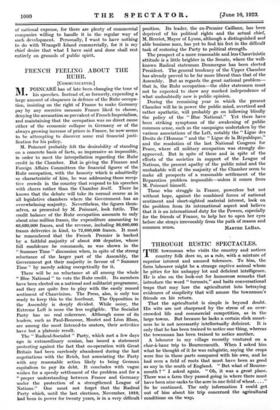FRENCH FEELING ABOUT THE RUHR.
[COMMUNICATED.]
MPOINCARE has of late been changing the tone of • his speeches. Instead of, as formerly, expending a large amount of eloquence in defence of the Ruhr occupa- tion, insisting on the right of France to make Germany pay by any coercive measure France liked to choose, denying the accusation so prevalent of French Imperialism, and maintaining that the occupation was no direct cause either of the economic collapse in Germany or of the always growing increase of prices in France, he now seems to be attempting to discover some real financial justi- fication for his policy.
M. Poincare probably felt the desirability of standing on a concrete basis of facts, as impressive as impossible, m order to meet the interpellation regarding the Ruhr credit in the Chamber. But in giving the Finance and Foreign Affairs Committees the financial figures of the Ruhr occupation, with the honesty which is admittedly so characteristic of him, he was addressing those recep- tive crowds in the country that respond to his speeches with cheers rather than the Chamber itself. There he knows that the debate will take its normal course as in all legislative chambers where the Government has an overwhelming majority. Nevertheless, the .figures them- selves, as presented by M. Poincare, look futile. The credit balance of the Ruhr occupation amounts to only about nine million francs, the expenditure amounting to 68,630,000 francs, and the revenue, including 36,680,000 francs deliveries in kind, to 72,680,000 francs. It must be remembered that the French Premier is backed by a faithful majority of about 400 deputies, whose full confidence he commands, as was shown in the " Summer Time " discussion when, in spite of the strong reluctance of the larger part of the Assembly, the Government got their majority in favour of " Summer Time " by merely asking energetically for it.
There will be no reluctance at all among the whole " Bloc National " to vote the Ruhr credit. Its members have been elected on a national and militarist programme, and they are quite free to play with the easily roused sentiment of Chauvinism. The Press, also, is only too ready to keep this to the forefront. The Opposition in the Assembly is deeply divided. While noisy, the Extreme Left is none the less negligible. The Socialist Party has no real coherence. Although some of its leaders, such as Paul-Boncour, Moutet and Leon Blum, are among the most listened-to orators, their activities have but a platonic result.
The " Radical-Socialist " Party, which met a few days ago in extraordinary session, has issued a statement protesting against the fact that co-operation with Great Britain had been carelessly abandoned during the last negotiations with the Reich, but associating the Party with any reasonable action likely to bring German capitalism- to pay its debt. It concludes with vague wishes for a speedy settlement of the problem and for a " proper understanding between France and Germany under the protection of a strengthened League of Nations." One must not forget that the Radical Party which, until the last elections, November, 1919, had been in power for twenty years, is in a very difficult position. Its leader, the ex-Premier Caillaux, has been deprived of his political rights and the actual chief, M. Herriot, Mayor of Lyons, although a distinguished and able business man, has yet to find his feet in the difficult task of restoring the Party to political strength.
The prospect of a more reasonable and less Chauvinistic attitude is a little brighter in the Senate, where the well- known Radical statesman Doumergue has been elected President. The general tendency of the Upper Chamber has already proved to be far more liberal than that of the Assembly. But as regards the great national problem— that is, the Ruhr occupation—the elder statesmen must not be expected to show any marked independence of what undoubtedly now is public opinion. During the remaining year in which the present Chamber will be in power, the public mind, overtired and rather apathetic, will probably go on following blindly the policy of the " Bloc National." Yet there have been striking symptoms of the awakening of public common sense, such as the campaigns undertaken by the various associations of the Left, notably the " Ligue des Droits de l'Homme " and the " Ligue de la Republique," and the resolution of the last National Congress for Peace, where all military occupation was strongly dis- approved. But in spite of these and in spite of the efforts of the societies in support of the League of Nations, the present apathy of the public mind and the unshakable will of the majority of the Chamber seem to make all prospects of a reasonable settlement of the Reparation problem impossible—unless it comes from M. Poincare himself.
Those who struggle in France, powerless but not without hope, against the combined forces of national sentiment and short-sighted material interest, look on the problem from its international aspect and believe that it is an international duty for the Powers, especially for the friends of France, to help her to open her eyes before she strays irrevocably from the path of reason and






































 Previous page
Previous page